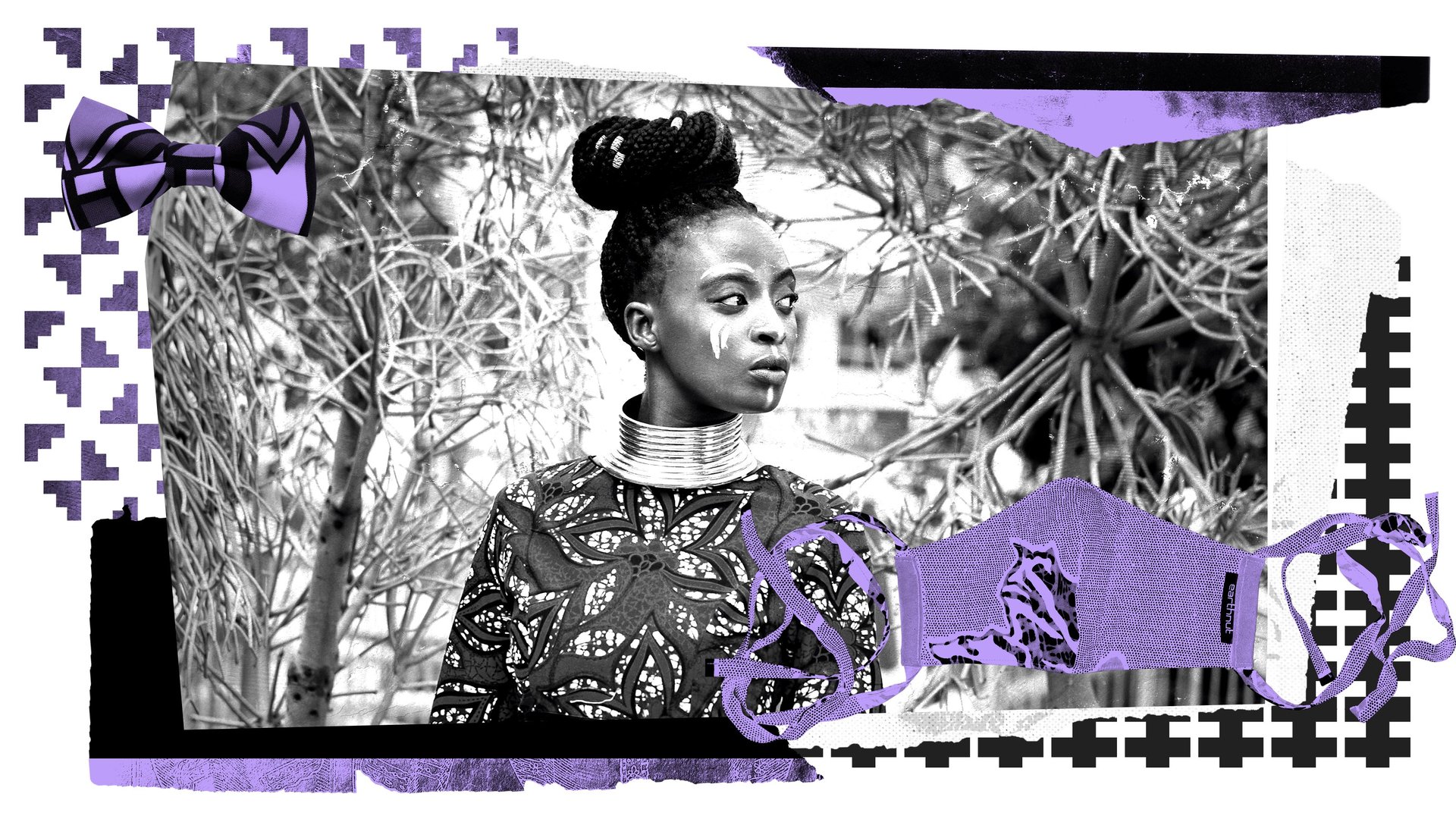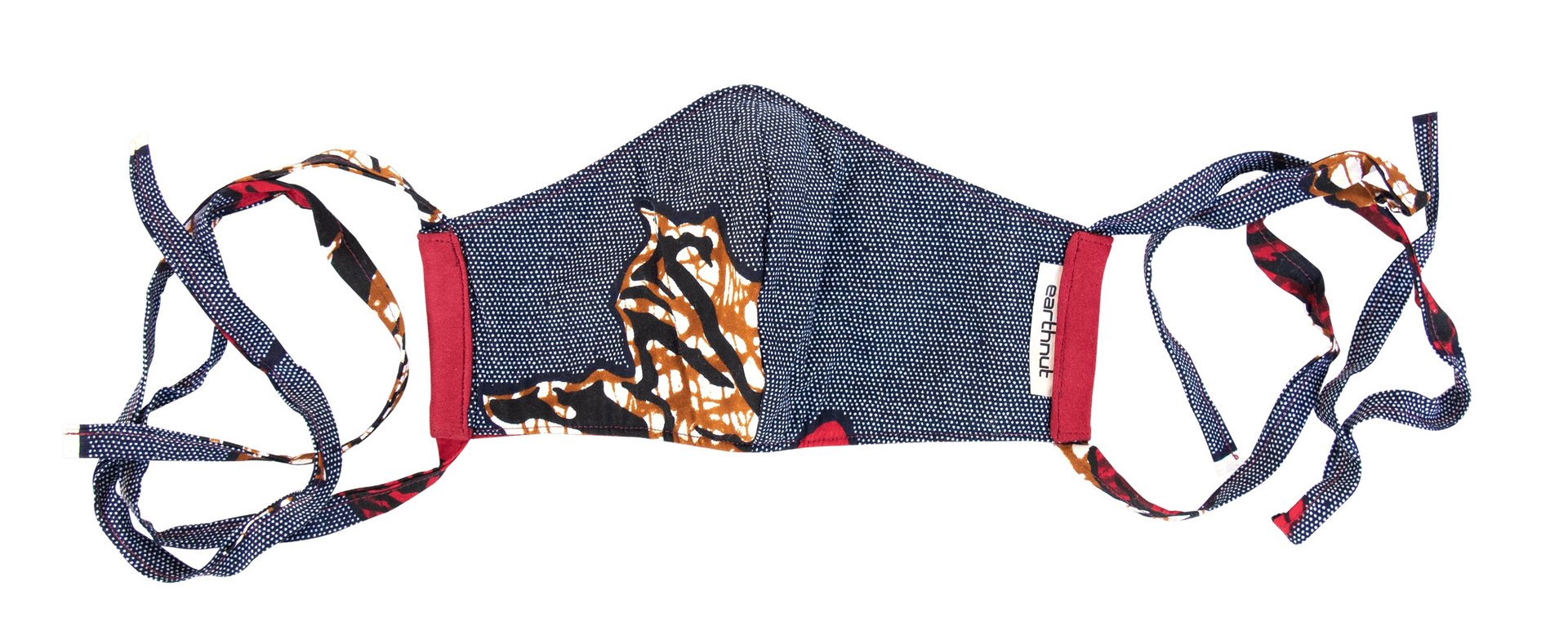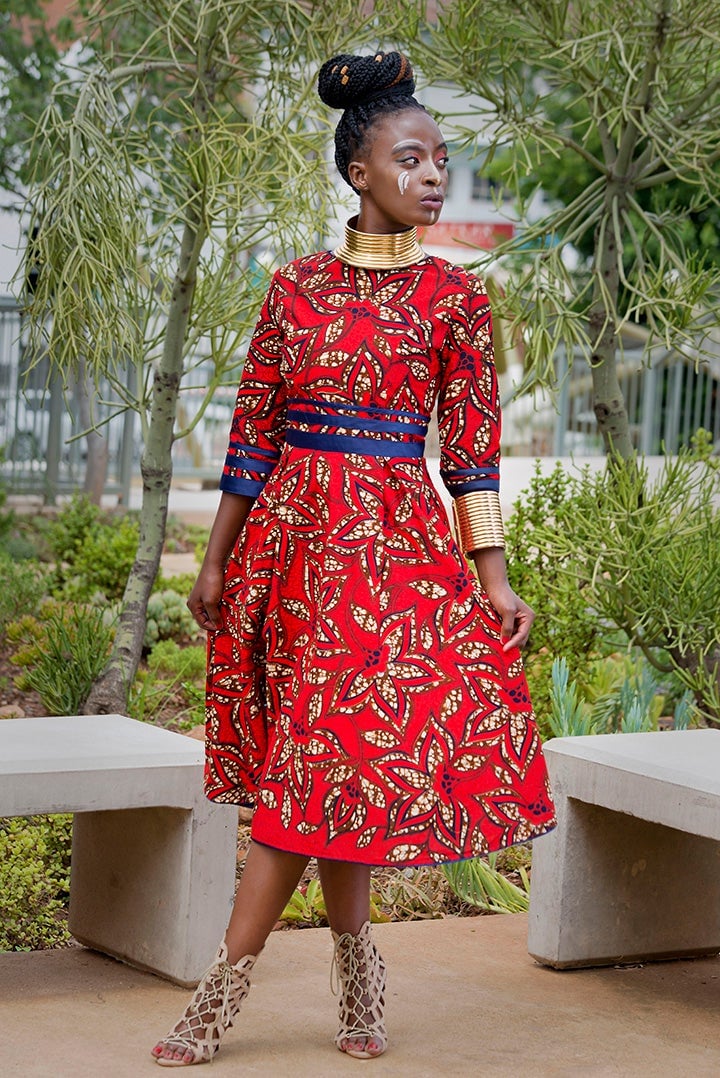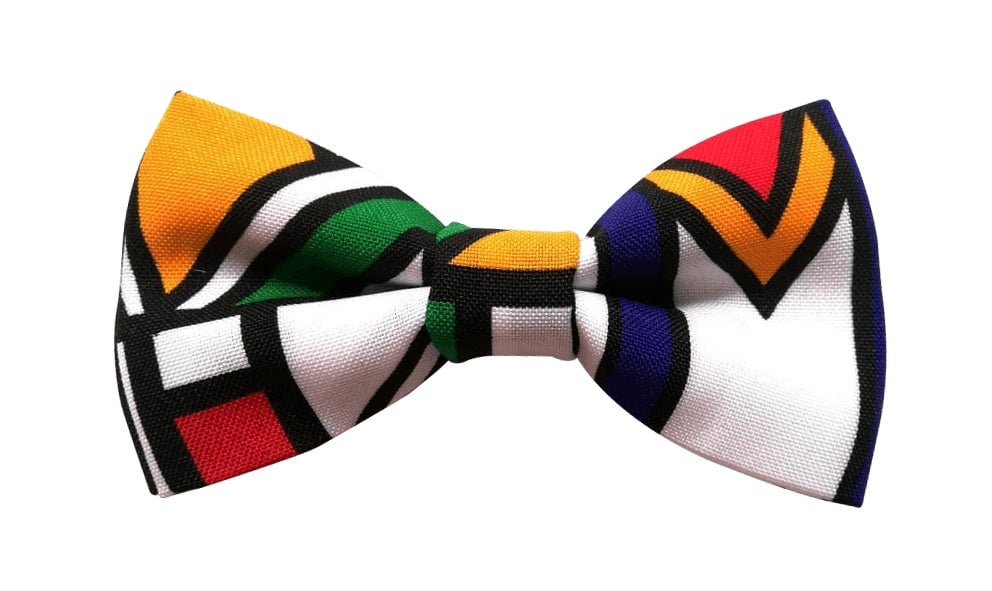South African women are forging new fashion frontiers by embracing their heritage
Zulu beaded necklaces, suit jackets with African print trimming on the lapel and sleeves—these are just some of the offerings from Earth Nut, a fashion label and Johannesburg-based shop that proudly celebrates Africa with workplace-ready attire. Its founder, Nosipho Maketo-van den Bragt, knew first-hand that there were women in high-flying corporate jobs who needed meticulously-tailored outfits that had colors and accents reflecting a beautiful heritage.


Zulu beaded necklaces, suit jackets with African print trimming on the lapel and sleeves—these are just some of the offerings from Earth Nut, a fashion label and Johannesburg-based shop that proudly celebrates Africa with workplace-ready attire. Its founder, Nosipho Maketo-van den Bragt, knew first-hand that there were women in high-flying corporate jobs who needed meticulously-tailored outfits that had colors and accents reflecting a beautiful heritage.
Though the pandemic has meant that most people are working from home, enterprising designers such as Earth Nut have innovated, selling face masks that both protect their wearers and promote their culture. On Instagram and across websites and online storefronts, masks tell the story of a colorful culture. They come in the bright red and blue of East Africa’s signature Maasai Shuka fabric, in the earthy yellow, green and orange tones of Ghana’s Kente cloth, and in the kaleidoscopic hues of South African Shweshwe print.
Earth Nut is just one of the companies meeting a growing demand for traditional African details in work attire. These outfits aren’t necessarily for special occasions such as Heritage Day which is supposed to be a celebration of all the varying cultures and heritages of South Africa. Rather, they are an opportunity for working women to express their culture as a normal lived identity and not something to showcase on special dress up occasions.
“I do think African people are no longer hiding behind other cultures,” Maketo-van den Bragt says. “In a sense, through fashion and design, we are coming out of the shadows and bathing in the limelight of our presence, dominance, creativity, social power, and achievements. I think the popularity of the African aesthetic is about self-love and self-validation.”

Symbols or style
They are African every day of the year, but many women who work in corporate settings have traditionally not been permitted to celebrate or showcase their full identity. Their cultural identity needs to be restrained, and replaced with the established code of corporate clothing, which is often Western. It has been this way for decades.
One high-profile example happened on Africa Day 2016. Nontobeko Sibisi, a journalist at South Africa’s first 24-hours new channel, eNCA, appeared on screen wearing an African print head wrap, or doek. The station pulled the piece, and South Africans voiced their support for both Sibisi and doeks. Social media users posted images of themselves wearing doeks, and hashtags such as #respekthedoek and #DoektheNewsroom began trending.
Responding to widespread criticism, eNCA never confirmed that the piece had been retracted because of Sibisi’s attire. But the station did concede they needed to review their clothing policy. Mapi Mhlangu, the news director at the time, said the doek drama was an indicator of a bigger shift: “The issue of a doek is merely a symptom for a larger call for change in contemporary South Africa,” she told Eyewitness News.
Maketo-van den Bragt felt it too, when she worked as a corporate attorney. Reflecting on the early years of her legal career, she recalls a covert programming that anything with African print or African ideas was seen as outdated or too quirky or not attractive. Imported from Europe, the legal system practiced in South Africa subliminally expected a European approach, even down to work wear. “No one wants to feel that they are not moving in step with accepted norms, so when I was in practice, this meant not wearing African prints or openly validating Afrocentric ideas and concepts,” Maketo-van den Bragt says.
Those who did were often seen as rebels and upstarts. Unfairly imbued with a political agenda, wearing traditional clothing “was seen as akin to putting the black power fist in the air,” says Maketo-van den Bragt.
Over the past few years, however, incidents such as Nontobeko Sibisi and the doek debacle have helped steer corporate culture in South Africa towards a growing embrace and acceptance of Africa, and African fashion.
Increasingly, South African women are bringing their brains, and bold fashion heritage, to the workplace. Where dressing for an important work occasion might once have constrained women to the conventional dark bottoms and jacket with a light colored blouse, today more women are choosing to add color and culture to their work attire.
This is perhaps one of the reasons why global fashion retail brand H&M had its first collaboration with Mantsho, an African fashion label, in 2019. This partnership with the Swedish retail giant meant that the South African brand joined the ranks of chic global brands such as Moschini, Balmain, and Versace. Comprised of easy-fitting cuts in a range of colors such as blue, brown, and black with hues of pink, amber, and red, H&M described the collection as celebrating “the elegance and vibrancy of Africa with modern edgy designs created for the stylish carefree woman.” On the launch day, the Mantsho x H&M merchandise sold out at several local H&M stores within hours.
For women wearing such Afro-centric looks, sometimes the outfits are merely the preferred style du jour. Other times they’re the deliberate and intentional symbol of African pride.
Johannesburg-based career coach and CEO of Hesed Consulting Vumi Msweli, has clients across the African continent. Having always been rooted in her African identity, means she’s just as comfortable in a Shweshwe print suit and matching doek, as she is to attend a meeting in Lagos wearing a traditional Nigerian outfit of a buba and iro with a gele tied over her head. She has qualifications from universities in New York and London and has worked in many international offices but considers her continental roots as a major selling point. “I often say I am a proudly African global citizen,” Msweli says. “Thinking globally should not be in exchange for what makes us African. Rather, being African allows us to see the world through a certain lens and more often than not have a shared experience such as valuing Ubuntu, a tangible sense of community, a rich heritage, and culture.”

Changing norms
The coronavirus pandemic may have shut down much of the country, but it hasn’t slowed South Africans’ trend of donning attire that displays their cultural pride. The extended closure of beauty and grooming establishments has led to a growth in demand for headscarfs. They present a savvy solution to the challenges of isolation. Haven’t been able to get your hair braided in 2 months? Wear a headscarf! Has your hair started to set into dreadlocks for lack of a thorough salon wash and blow dry? Wrap it up. Run out of time to do your hair and makeup before a video meeting? Quick, pop on a doek. In most of these scenarios, the resulting look is one of style and elegance that beautifully covers up the challenges underneath.
As many South Africans practice social distancing by staying at home, corporate dress codes have been adjusted. Where once a pencil skirt might have been paired with floral blouse and tailored jacket, the prevalence of video meetings means full corporate outfits aren’t always necessary. What counts is what’s visible which is often only from the waist up.
For those days where comfort comes first and changing out of jogging bottoms is a mammoth task, it’s possible to be corporate and stylishly African in the upper half of your body. Based in Durban, South Africa, Polka Dot Coco is a handcrafted accessories business. They make earrings, ties, and bowties with a proud ethnic touch. During the coronavirus pandemic they’ve introduced a new range of masks that includes sunflower, floral and zebra prints. But one of their most popular products has been a bow-tie made with the signature geometric shapes that characterize the Ndebele print. Featuring a white background with shapes in red, orange and green, the tie is gender neutral and can be dressed up or down.
Mamokgethi Phakeng, professor and vice-chancellor at the University of Cape Town, is one of their clients. She recently paired the colorful Ndebele print bowtie with a crisp white button-up shirt and navy pants for a public speaking engagement hosted in partnership with the government’s Higher Education & Training Department. Zama says it was “such an honor” to have the professor wear the brand but also upload three separate posts praising the brand on her Instagram. The endorsement was a valuable marketing boost that has helped the Ndebele print bow-tie become one of their best-known and top selling products.
While most public events are on pause, accessories such as necklaces, bowties, and headscarves can offer a sartorial boost to the list of home office necessities. And when such products feature African accents or prints, they allow the wearer to “make a statement without saying a word,” says Nelly Zama, the founder of Polka Dot Coco.

During the course of South Africa’s lockdown, many fashion retailers have seen a serious drop in sales. Many non-essential shops were completely closed during the first six weeks of the lockdown, decimating opportunities for revenue generation. However it did give brands like Earth Nut and Polka Dot Coco time to strategize. They had clothing and accessories in their factories and shop floors that couldn’t be sold and had to think about what products would be most viable in this new market. This led them to make products that are more appealing during the pandemic, such as masks.
As the government has started easing restrictions, sales of masks are beginning to increase. Though their low price point means the masks garner significantly less income than clothiers’ dresses, skirts, or jackets, selling masks has enabled continued relevance. “Personal protective equipment can be both functional and stylish,” says Zama of Polka Dot Coco. Time will tell if the masks become bigger money makers later on, but for now, “selling the masks shows our customers that we are all in this together,” Zama says.
For many women, wearing this clothing is intended more as a boost for their own self-image than for beholders to admire. Whether it’s a regal Xhosa headwrap, or a blazer trimmed with African print fabric, or the inclusion of Zulu beadwork bracelets and neckpieces as accessories, clothing items that honor African roots help the wearer walk with strength and confidence. This is something that a conventional power suit often can’t achieve. There is a unique power in dressing with items that draw on a proud African history. They celebrate the lineage of queens and matriarchs who carved the pathways to the boardrooms and c-suites in which African women increasingly sit.